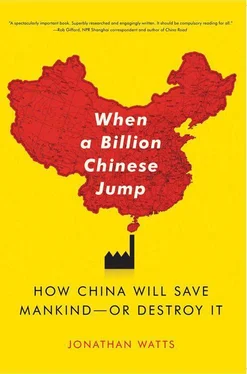Thirty years earlier, most residents were farmers living in small, one-story houses. Few could afford a bicycle. By the time I arrived, they were shareholders with an average living space of more than 450 square meters and at least one family car provided by the village, which had a fleet of 500 vehicles, including twenty Mercedes-Benz sedans and, of course, a stretch limo.
Although everyone on the Huaxi family register was classified as a farmer, many had become wealthy industrialists able to live off their capital and the work done by migrant labor. Residents received a yearly salary of more than 10,000 yuan, a bonus of 70,000 yuan and dividends of more than 150,000 yuan. On paper, their income was more than twenty times the national average.
Unlike in Guangdong, governance was not an issue at this local level. Far from it. Under the benevolent dictatorship of the old village chief Wu Renbao and his sons, the streets were clean and the local workforce was tightly disciplined.
The Wu family’s grip on village life was little short of feudal. They were Big Brother, Big Daddy, and Big Grandpa rolled into one, controlling everything from village-hall politics and corporate strategy to nursery schools and the propaganda theater. Under their strict leadership, holidays were rare even on weekends, entertainment was considered an unwelcome distraction, and no one was allowed to take their paper assets out of the community. Locals were free to leave, but only if they left their assets behind. They accepted Wu’s rule because he kept raising their living standards. In this way, he led their entire town up the economic value chain. As I learned from the old patriarch, it had been a tough, dirty journey.
I joined Wu at a performance in the Ethnic Minority Palace, the theater at the center of the village’s cultural and propaganda activities. On stage, the play was about—what else?—the glories of Huaxi. The dancers lip-synched a song about the benefits of more cars and DVDs in front of a backdrop of the town with giant neon characters that spelled out the slogan “Number One Village in China.”
During the show Wu was constantly interrupting to shout orders to the performers and deliver a running commentary to a group of visitors. I was told he also wrote the script, a sign that, although nominally retired, the old cadre could not completely give up a lifelong urge to choreograph the community. 3Why should he? Wu’s force of personality had defined the character of the village for more than forty years.
Afterward, the great man granted me an audience. Legs splayed and leaning back on a folding chair, he gruffly explained how he created the Number One Village in China. It was hard to make out. Wu’s dialect was so thick that my translator occasionally needed a translator, but the story was well known. Wu’s biography was a classic tale of modern China. From swineherd to industrialist, and from political persecution to entrepreneurial opportunism, Wu led his community along the long, dirty pollution chain from pesticide to aluminum to steel. It was not a forced march. Wu kept his followers going by offering ever-greater incentives.
“In the past,” he said, “when we lacked food, our biggest hope was just to get enough to fill our stomachs. Then, when we had enough to be full, we wanted better-quality food. After that, we wanted everyone to be able to eat all they wanted. Now villagers aim for five things: cash, a car, a son, face, and a house. We can provide all of this, so our mission must be something greater.” Today, Huaxi’s priority is not food but ideology. “We are the Number One Village in China. Our aim is to make all of China rich.”
Expansion underpins what Wu calls the “Huaxi model.” A speck on the map, it initially accumulated capital through the heavily polluting pesticide and aluminum industries. It then became one of the first Chinese villages to list on a stock exchange and the first to franchise its brand, renting the Huaxi name to tobacco grown in Yunnan (another cause of the loss of old-growth forest noted in chapter 1) and a hotel chain in Beijing. More recently it had started to upgrade its steel-milling machinery and begun exporting across the globe.
Wu’s life mission could be boiled down to two words: wealth generation. For him, it was the only ideology that mattered. The seventy-nine-year-old was from a generation that had lived through enough upheavals for several lifetimes. Occupation, revolution, liberation, starvation, persecution, and exploitation—he experienced them all. For him, imperialism, communism, Maoism, and capitalism were not abstract terms in a textbook but ideas that had shaped and reshaped his existence. Perhaps because he knew them so intimately, he had little truck with labels: “It doesn’t matter whether it is a new kind of ism or an old kind of ism, our aim is to make everyone rich.”
Old Wu was becoming a legend in China. According to officially sanctioned biographies, such as the modestly titled Brilliant Wu Renbao, 4he started work at the age of eleven, swilling out pigsties by day and nursing his boss’s paralyzed son by night for an income of 40 kilograms of rice per year. This earthy beginning was to prove an asset after the communists took power in 1949. With impeccable class credentials, Wu rose quickly through the party ranks to become village chief and established Huaxi’s first commune in 1961.
The party loyalist proved himself a pragmatist, a risk taker, and a rule breaker. 5While the rest of the country was turning its back on capitalism during the Cultural Revolution, Wu secretly established a hardware factory. To conceal its existence from visiting officials, it was built in a swamp and surrounded by trees. This subterfuge was to cost Wu dearly. On New Year’s Eve 1967, Red Guards hauled him into the village square and accused him of being a Capitalist Roader. “It was the toughest time of my life,” he recalled. “In a single night, I was stripped of my official titles, publicly condemned, and saw my sons savagely beaten. One is still paralyzed. I’m a very firm believer in the Communist Party and socialism. But that period was a test for me.”
Wu’s real skill was in knowing when to buck prevailing trends and push at the boundaries of risk. In the early reform period of the 1980s, nearly every commune in China was returning land to farmers, but Wu did the opposite. He requisitioned dozens of plots and established a pesticide factory. It was dirty and polluting, but it turned over 2 million yuan a year. Textile mills and other plants followed as Huaxi blazed a trail for the thousands of town and village enterprises that sprang up across the country during this period. 6The environment was not given a second thought. By 2000, town and village enterprises accounted for more than half of China’s pollution.
In Jiangsu, local government-run businesses expanded faster than anywhere, at one point employing almost a third of the population. Huaxi kept ahead of the pack thanks to Wu’s knack of reading the political tea leaves. In 1992, he watched a TV broadcast of Deng Xiaoping’s famous pro-entrepreneurial speech during a tour of southern China. Immediately, according to his biographers, he foresaw a surge of economic activity and ordered village officials to borrow every yuan they could lay their hands on to buy up aluminum and other raw materials. Within three months, goes the story, the price of aluminum tripled. But his admirers fail to mention the environmental cost. Aluminum smelting is one of the three heaviest-polluting and energy-intensive industries in China. The worst was steel. This was the business that Huaxi moved into next.
The village bought milling equipment and blast furnaces. This was the trend at the turn of the century as China’s economy became increasingly driven by resource- and energy-intensive industries that were no longer economical in the West because of tightening environmental regulations and increasing labor costs. 7Much of the equipment was made locally, but entrepreneurs from Jiangsu and Hebei also snapped up old blast furnaces from the Ruhr, dismantled them, and shipped them piece by piece to towns and villages on the other side of the Eurasian landmass. 8Though reported in Europe at the time as an alarming shift of industrial power and jobs, it was also a relocation of pollution and carbon emissions. China quickly overtook Germany, Japan, and the United States to become the world’s biggest steel producer with more than a third of the global market. That fulfilled another of Mao Zedong’s dreams, but the great news for China’s economy was awful for its environment. 9Steel soon came to account for a tenth of the country’s energy demand and a similarly large proportion of its acid rain and carbon emissions. 10
Читать дальше










